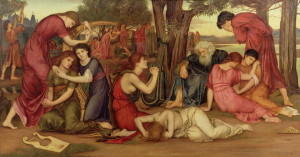It is vitally important to be very careful about what you pray for—because God might just decide to give you exactly what you requested. When, for example, we pray for God’s help in deciding the right thing to do, do we really want him to do that?
Doing what’s right is often entails making some sort of sacrifice we don’t really want to make. Wouldn’t we really be much happier if he simply left us to fester in the dark?

“By the Waters of Babylon” (Psalm 137), Preraphaelite painting (1882-1883), from Wikimedia
They knew their dreams were impossible, of course. They were held captive by the only superpower in the Middle East. But these pious hopes were constantly on their lips—in prayers and psalms—not because great prophets like Isaiah and Jeremiah, had foretold that one day they would return, but because saying these prayers made them feel good. And because they knew they would never be fulfilled, it was a cheap and easy way of pleasing God.

Belshazzar’s Feast, by Rembrandt Harmenszoon van Rijn (1606–1669), from Wikimedia
Now you might imagine that the Jews were overjoyed about this. After all, God had given them everything they’d prayed for during all the long years of captivity. In one fell swoop, all of their prayers had been answered—to the letter. Thus, you might imagine that when they heard the news they opened their best bottles of wine, cooked mountains of food, and invited the neighbors round for a celebration.
You might imagine that, but if you did, you’d be completely wrong. Most Jews were anything but happy. They had prayed continually to God to allow them to go home, but when he actually answered their prayers, they discovered they really didn’t want to go after all. Suddenly they realized that rebuilding Jerusalem wasn’t at all a part of the future they had mapped out for themselves and their children.
Nor should this be entirely surprising. Most of the exiles had never seen the place. The only people who actually remembered the city in all its glory were old geezers, looking back on the place through the rosy prism of sentimentality. Everyone else had been born in exile. They had married, raised children, and gone into business. They liked big city life. They didn’t want to go back to some nasty, bug-infested, rural backwater with no indoor plumbing.
For many of them, Cyrus the Great’s edict was a moment of truth. It confronted them with the fact that they weren’t really Jewish at all, but, rather, Babylonians who—by mere historical happenstance—worshipped in a Jewish manner. When it came down to the matter of loyalty, their loyalties were to Babylon, its lifestyle, culture, and material comforts; not to the Lord God of Israel to whom they had been so earnestly praying.
The truth of the matter seems to be that people, for some reason or other, like to think of themselves as victims. They enjoy sitting around nursing old wounds and imagined slights, whining about how badly they have been treated and how things would much better if only … But when God answers their prayers and starts to set matters right, they don’t seem to like it at all. They actually seem to prefer things the way they were when they were whining and moaning about them.

Reconstruction of Jerusalem and the Temple of Herod, by James Tissot (1836–1902), from Wikimedia
Human nature being what it is, it probably shouldn’t be entirely surprising that the story behind the building of almost every church echoes, to some degree or other, history of the rebuilding of Jerusalem after the Babylonian exile.
It usually starts off with beautiful thoughts—a commonly shared vision—that everyone knows cannot possibly come true. Then, suddenly, God creates the opportunity for the fulfillment of that vision—albeit by dint of an enormous amount of effort and sacrifice.
No less suddenly, of course, large numbers of the people who had been sharing those beautiful thoughts—that common vision—get cold feet. Suddenly, the prospect of worshipping God in the beauty of holiness doesn’t seem quite as attractive as golf at the country club or a European vacation.
And besides, the dear old Temple of Baal has such nice stained glass and such wonderful Victorian woodwork—especially compared with the cheesy, cheap, and cheerful sort of place that the new Temple will be.
Building a new church takes an extraordinary high degree of “stick-to-it-iveness.” It’s an exercise, which rapidly sorts the wheat from the chaff. The room for disagreement is just enormous—not in the important things, but in fripperies like matters of taste.
It is only by the rigorous application of Christian principles that one can ever hope to get through it. It is truly a question of loving one’s neighbor as much as one loves oneself—no easy task when one knows that, in matters of taste in church architecture, one’s neighbor is a complete and utter Philistine.
God called the people of Saint Stephen’s to set about rebuilding his Temple over 30 years ago. And this parish church was the product of decade of praying, planning, working and, fund-raising. Twenty years ago last month we worshipped in it for the first time.
Sometimes it felt like we had been building forever. When the returning Jews rebuilt the Temple Jerusalem, it took well over 50 years to put up something acceptable. In fact, we are told that old folk who remembered the old Temple of Solomon took a look at the first reconstruction effort and wept.
And by the standards of the folks who put up Cologne Cathedral we worked at warp speed. That great church took more than a thousand years to build. In fact, we date pictures of old Cologne by the position of the crane on the Cathedral towers.
That building Saint Stephen’s was a labor of love goes without saying. That the task was hard, daunting, and sometimes bitterly disappointing cannot be denied. Nor can we avoid the fact that that sort of work will continue as long as this building stands. Indeed, it should continue, for it is the duty we owe to God.
But how good it felt to echo the words uttered by the returning remnant of Israel two and a half millennia ago: “The Lord is in his holy temple. Let all the earth keep silence before him … I was glad when they said unto me, we shall go into the house of the Lord.” GPH✠


